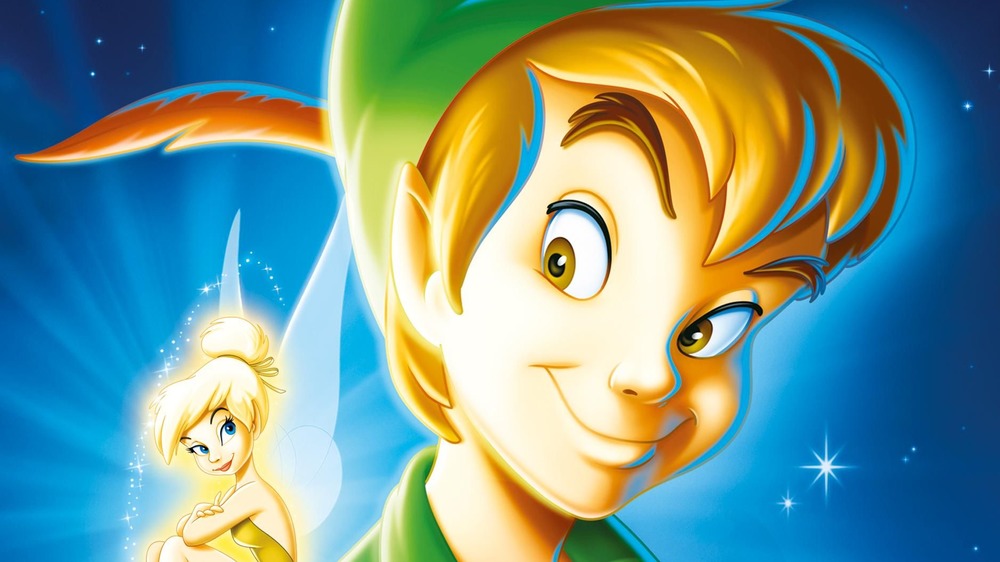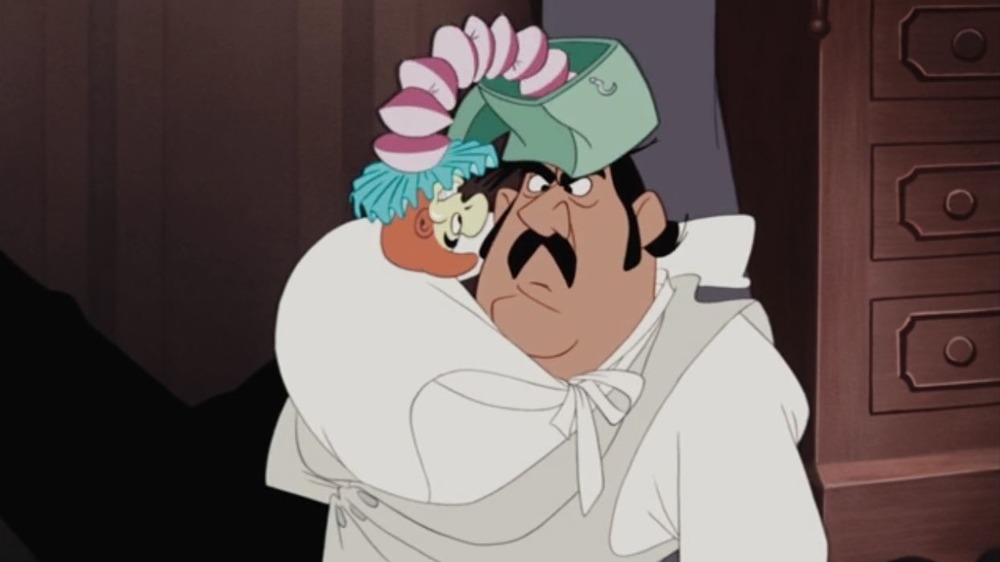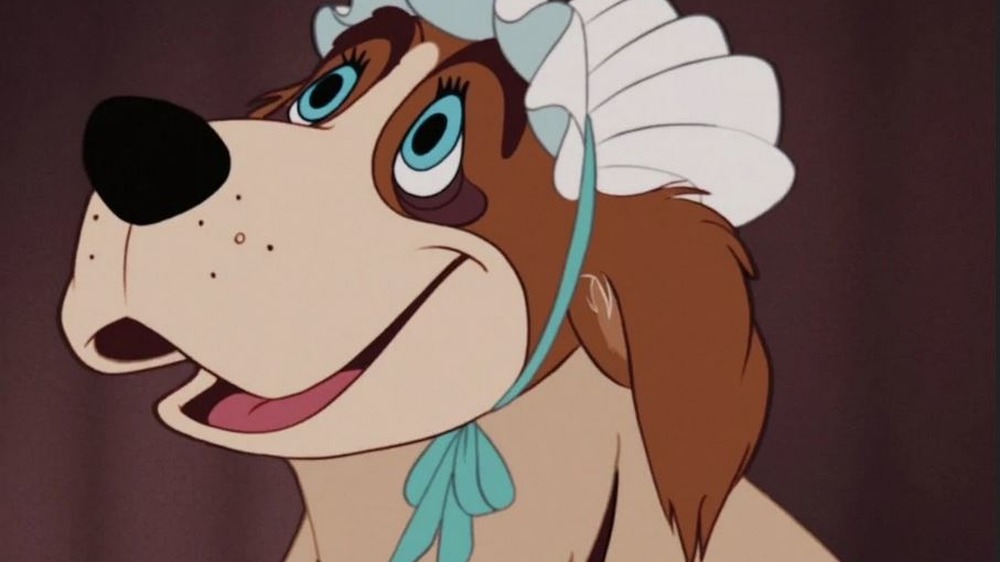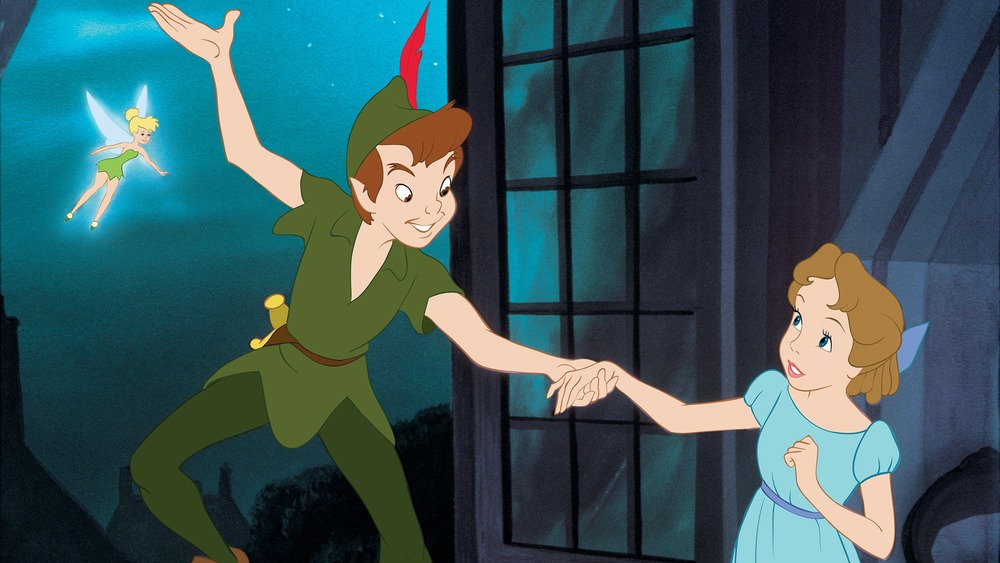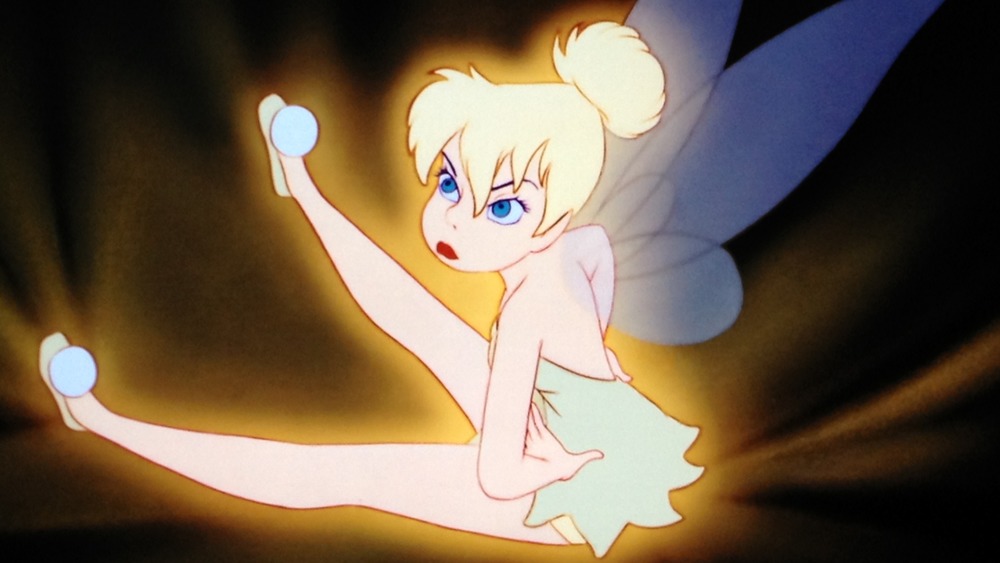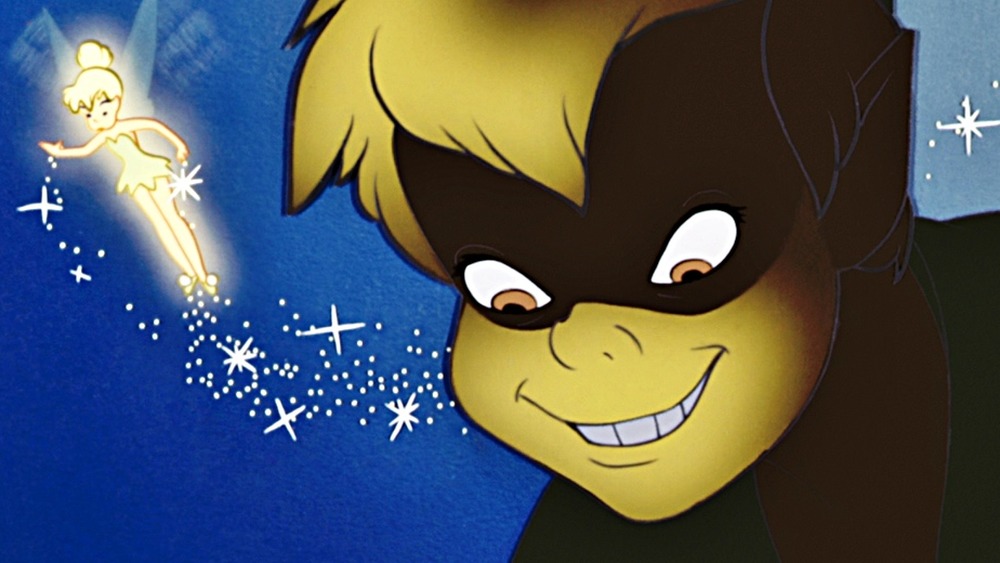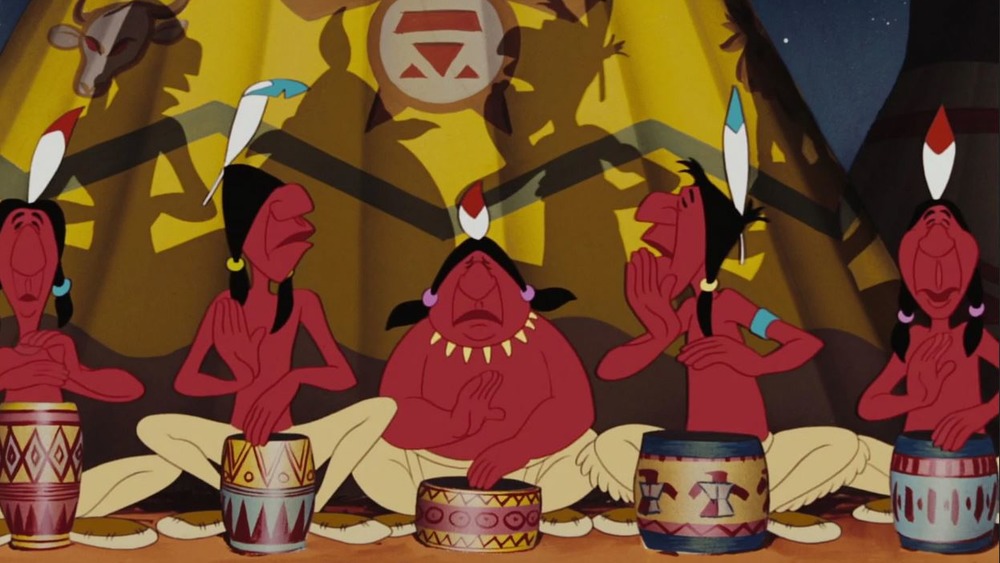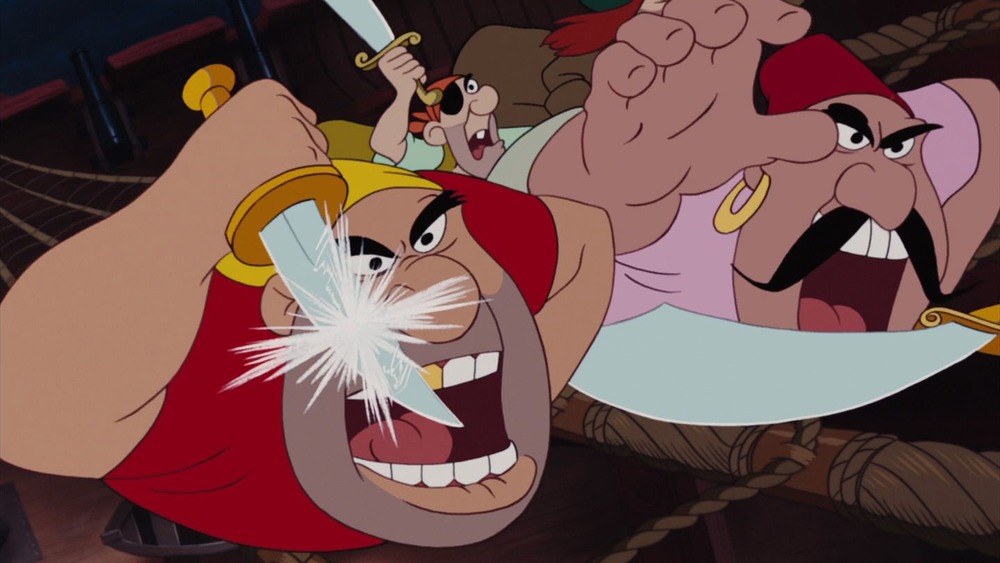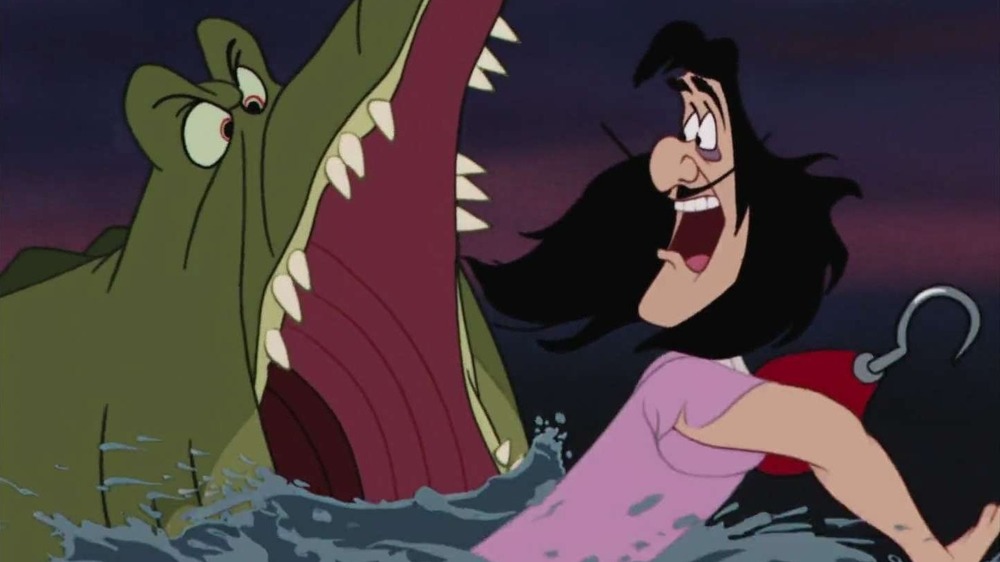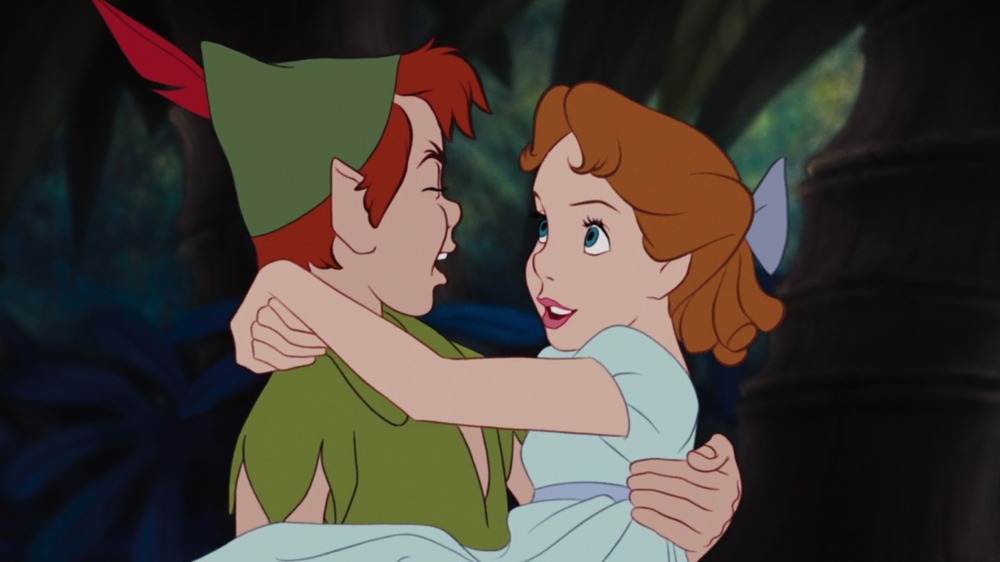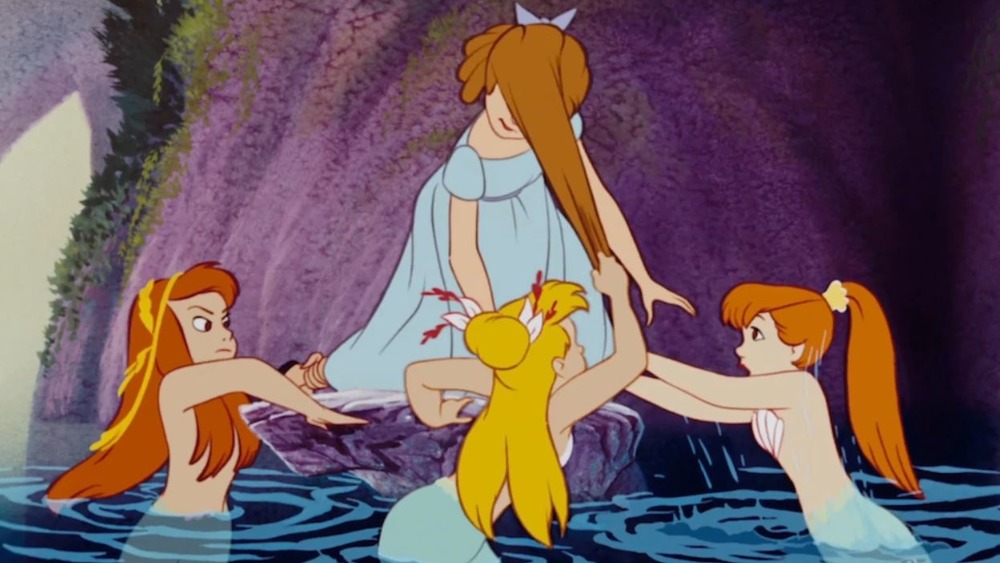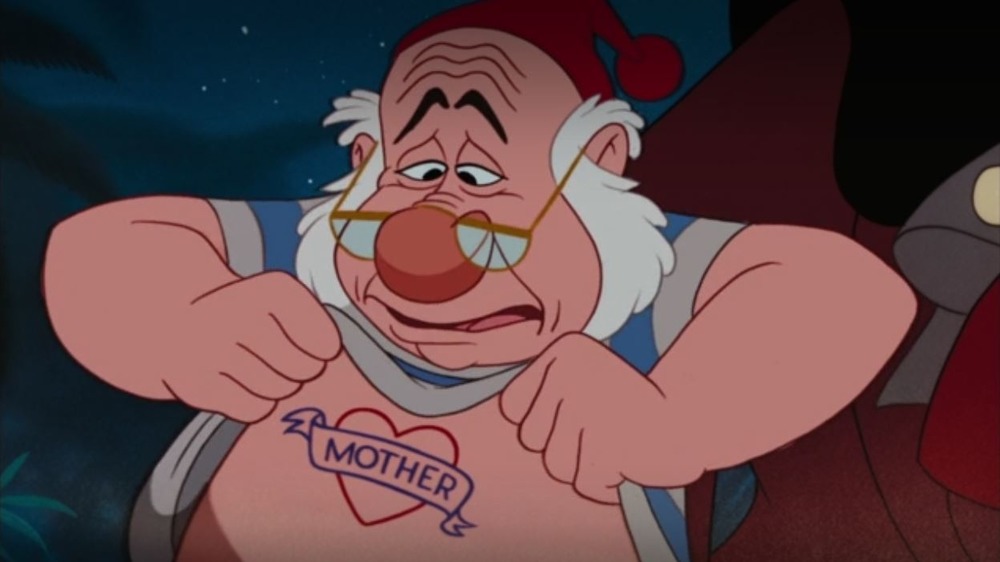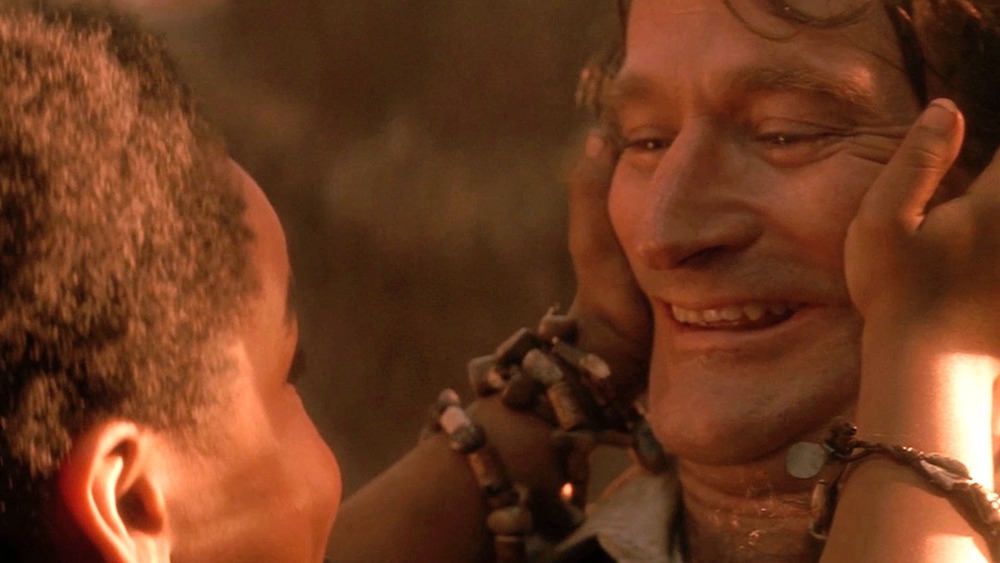Things Only Adults Notice In Peter Pan
Disney's classic films have been loved by families for generations, offering countless moments of respite for parents and caretakers while inspiring the hero within viewers of all ages. One of those favorites is Peter Pan, a tale that entices the wild spirit of youth and childhood imaginations. The idea of never having to grow up and flying off to a fantastical land inhabited by fairies, mermaids, and pirates sounds like the epitome of bliss to the young mind. Longing to transcend the anchor of responsibility is a struggle anyone can identify with, especially those undergoing times of uncertainty. Peter Pan takes audiences away from those burdens for a short while, in a cacophony of pixie dust and singalongs.
Unfortunately, this Disney film hasn't aged well over the years. Much of its controversy goes over kids' heads, but older viewers may find themselves disturbed by what was considered acceptable viewing material several decades ago. The script is laden with quite a few eyebrow-raising issues, right down to the lyrics of its beloved songs. Plus, some of the relationships between the characters are ... well ... a bit unsettling. It's not all bad, however. Peter Pan is loaded with laugh-out-loud moments and touching scenes sure to melt even the toughest pirates' hearts. For good or for ill, here's everything older viewers can't unsee in Peter Pan.
The chaos in Peter Pan's nursery scene is all too relatable
Being a parent can make even simple tasks incredibly chaotic, as glimpsed during the first scenes of Peter Pan. Inside the Darling home, adults George and Mary are preparing to attend an upscale office party. However, George can't find his cuff links or shirt front. While searching the house, he seeks them out in the nursery, where his sons, John and Michael, are pretending to be pirates and playing quite boisterously.
When asked if they've seen any of his misplaced items, George learns the boys are using his cuff links as "buried treasure" and the shirtfront as a "treasure map." Growing ever more frustrated (as only old-school, dignified English fathers can), George stuffs the shirt front on, only to learn why Michael referred to it as a treasure map — his youngest son has drawn one all over it with colorful chalk. With his anger mounting to a boiling point, George then trips over a huge stack of wooden blocks, along with the family dog, Nana.
The whole family exclaims "Awww!" and runs over to who you assume will be George, as does he. However, his wife and children run past him to console Nana, instead. It's one of the funniest scenes of the whole movie — partly for the silly slapstick, but mostly because of how relatable the extreme chaos is for those familiar with children's inadvertent antics.
Nana is the best dog
After losing his temper early in the film, George Darling takes his frustrations out on Nana, the canine nanny, by banishing the poor dog outside to her lonely, drafty doghouse. It's sadly ironic as she's the least chaotic and most helpful member of the family. This is extra cruel considering she's not just any dog — Nana thinks of herself as a nursemaid and that she belongs inside watching over the children. She does all the things a traditional caretaker would, modifying activities to accommodate her lack of opposable thumbs.
It's hard not to marvel at her incredible dexterity and ability to carry out a multitude of tasks. Even professionally trained dogs could learn a thing or two from Nana's extensive skill set, and yet the Darling family seems to take her for granted. For example, while George is pacing about, making a scene over his outfit's accessories, Nana cares for the kids in the background. She makes their beds, brings them their "tonic" on a carefully balanced tray atop her head, pours it into even spoonfuls for each child, and neatly stacks up wooden blocks scattered across the nursery floor.
Nana is so loyal that when George struggles to find the rope outside her doghouse, she pauses mid-banishment to find it for him. Good girl, Nana — it doesn't matter what Daddy says, you're the best nursemaid-dog, ever!
Hold up, who's coming to your window at night?
As a child, it feels perfectly innocent to fantasize about some magical person coming to your window to take you away on adventures in faraway lands. As an adult, however, the thought of strange boys visiting underage daughters via bedroom windows is less than charming.
When Wendy claims Peter Pan has been to the nursery before and must be surely coming again because she'd "found his shadow," her father brushes it off as mere "poppycock" and doesn't take it seriously. However, had the same conversation been with more literal/paranoid guardians, Peter likely would've found a father cleaning his shotgun in that nursery instead of a pining, unattended Wendy. At the very least, it would've been wise to leave Nana in the house with the kids, rather than tied up outside.
On top of that, the grown mind can't help but question Mr. and Mrs. Darling's decision to leave their young children home alone for hours without any sort of adult supervision. If you're not going to have your dog babysit your children while you're out partying, at least find a human to do so.
Tinker Bell is an attempted murderer
Fairies are some of the most iconic creatures in fantasy, but their disposition varies widely between sources. In some instances, they're benevolent and wise, like Cinderella's Fairy Godmother, while other portrayals show a more malevolent nature, such as those depicted in medieval lore. Peter Pan's sidekick, Tinker Bell, seems to lie somewhere in the middle.
Tink displays a mean, jealous streak the moment she learns Wendy will be accompanying them back to Neverland, going so far as to make an attempt on Wendy's life without Pan's knowledge. After losing Wendy while flying to Pan's hideout, Hangman's Tree, Tinker Bell tells the awaiting Lost Boys that Peter gave orders to shoot down a terrible "Wendy-bird" spotted in the local skies. Sadly, their aim is true, but Pan manages to fly over in time to save Wendy from crashing down onto the jagged rocks below.
When Pan asks if Tinker Bell realizes her rash actions could've cost Wendy her life, Tinker Bell smiles and replies "yes" with a sassy shake of the hips. After being banished for her malicious plot, Tink makes things even worse by turning on Peter — disclosing his hideout to his arch-nemesis, Captain Hook. Thankfully, she redeems herself in the end by saving Peter from a bomb that Hook disguises as a gift from Wendy, but still, it doesn't excuse Tink's attempts at murder.
The dark side of Peter Pan
Being a child forever sounds liberating on the surface, but when examined more deeply, it has a dark side. Although infantile behavior brings carefree fun and spontaneity, it can also cultivate a short-sighted and selfish nature. Lack of experience and an unwillingness to gain insight from wisdom can be frustrating and dangerous.
This is exhibited time and again by Peter Pan, who repeatedly puts others in danger thanks to his immature actions and motives. From the moment he's introduced, he constantly makes everything about himself. As a kid, it's easy to mistake Pan's decision to take Wendy and her brothers to Neverland as a form of "liberation" and heroic rescue from growing up, which George tells Wendy she'll have to do starting the next day by moving out of the nursery with her brothers and into her own room.
However, more mature viewers are apt to note that Pan only invites them to Neverland because Wendy's imminent relocation would put an end to her beloved stories about, well, himself, of course. But the character's dark side doesn't stop there. Peter Pan also treats all the females in his life like trinkets rather than people, quickly moving on to the next shiny thing in front of him, like when he leaves Wendy for Tiger Lily. To top it off, he drops misogynistic insights that haven't aged well, like claiming "girls talk too much" and laughing when Tinker Bell calls Wendy a "big, ugly girl."
The Native American references are incredibly racist
When watching Peter Pan, adult viewers can't help but notice disturbing levels of racism in this animated classic. It's so bad that Disney+ even added a disclaimer on their site, warning viewers about "negative depictions and/or mistreatment of people or cultures."
Not only does Peter Pan depict Native Americans in horrifically prejudiced ways, the movie is carpet-bombed with racist slurs against them. Everyone, from innocent children and the heroic Pan to the villainous Captain Hook, casually speak of these nearly erased people as "savages" and much worse. The poor treatment of American Indians and other First Nations people culminates in a singalong, "What Makes the Red Man Red," which is loaded with cultural appropriation and racist stereotypes icky enough to make anyone's skin crawl.
In an even sadder twist, older minds may also make the ironically tragic connection that Neverland is filled with mermaids, fairies, and other beings who don't exist in the real world. Seen alongside these fantastical beings are Native Americans, who unlike those mythical creatures, actually did once thrive in the real world ... before being decimated by disease and genocide.
These are the worst pirates ever
Not everything in Neverland is sunshine and rainbows. In the shadows lurks a seasoned crew of pirates led by Captain Hook, Peter Pan's arch-nemesis. To the naive child's mind, Hook and his crew pose a formidable threat against Pan and the Lost Boys. However, older viewers can't help but question the effectiveness of the pirates' tactics, considering they've failed for years to track a group of children hiding out on a small island.
Hook and crew can't be very good at doing pirate things, like finding buried treasure, if they can't even locate a handful of rowdy kids among a half-dozen potential hiding places. Time and again, Hook falls for Pan's same old tricks and gimmicks, never learning from his repeated mistakes. Maybe Hook has dementia or something like that — he's certainly old enough to have some age-related memory issues coming on, especially with the repeated head trauma he suffers from accidents involving things like oars and seagulls.
On top of being a poor excuse for a pirate, Hook's beef with Peter Pan is also disconcerting when considering their difference in age. The pirate spends every waking moment obsessing over killing a mere child, manipulating Pan's friends and planting bombs in the process of attempting his twisted goal. If you're such a big tough guy, why not pick on someone your own size and age?
The crocodile complex
Captain Hook does have a viable reason for being upset with Peter Pan. After all, he's responsible for Hook having a hook in the first place. During a skirmish with the Disney villain, Pan cut off Hook's hand and fed it to a nearby crocodile ... who then developed a taste for the pirate leader's flesh. As a result, Captain Hook is constantly hunted by the crocodile, who follows him about Neverland and pops up when he least expects it.
Luckily, the crocodile also swallowed a clock, so he can be easily detected by the distinctive sound of ticking emanating from his tummy. (If only silent creepy-crawlies like spiders had clocks in them, too, they'd be so much easier to find in the house that way!) Hook's encounters with the crocodile make for some of the funniest moments in the film, but it also stirs up a question within the discerning adult mind.
Specifically, one can't help but wonder why Hook doesn't organize a group of his men to execute the beast so he no longer has to live in perpetual fear. He's a badass pirate captain, in charge of a ship loaded with cannons and other weapons — he should put those to good use against the crocodile so he can move on with his life. However, the interactions between Captain Hook and the crocodile sure make for humorous antics.
Mother, girlfriend, or both?
An uncomfortable aspect of Peter Pan comes into focus when analyzing the questionable relationship between Pan and Wendy. The two technically meet for the first time after he breaks into the nursery window at night while her parents are out, which is unnerving enough. However, Peter had to have been there at least once before while she was sleeping, considering Wendy found his misplaced shadow in the nursery — which definitely amps up the creep factor in this situation.
Then things get even more uncomfortable. While considering the weighty decision of whether she should go with a stranger to a strange land, Wendy wonders aloud what her "mother will think." Pan, being unwise in the ways of the world, asks Wendy what a mother is, to which she replies, "A mother is someone who loves and cares for you and tells you stories." And then Peter replies that Wendy can be "mother" to him and his fellow Lost Boys.
Moments after this statement, Wendy declares she's so excited to see Peter, she's going to give him a kiss — and not in the motherly sort of way. This has some weird Freudian connotations to say the least, and it sets a bit of an incestuous undertone between the two throughout the rest of the film.
The mermaids are stuck-up, conceited, sociopaths
They say you should never meet your heroes, and for those who idolize mermaids, this is particularly true while watching Peter Pan. Mermaids are generally depicted as friendly, benevolent creatures, like in The Little Mermaid or Splash. However, Neverland's resident merfolk have darker natures, which Wendy learns to her detriment while exploring the area with Peter.
As it turns out, Peter is quite the ladies' man, and Wendy finds herself vying for his attention while he catches up with fan-girling mermaids in a Neverland lagoon. Once they notice Wendy, however, the mermaids switch from flirtatious vixens to jealous tyrants, and they attempt to pull her under the water ... while Peter looks on, laughing. This is the second time Wendy nearly meets her fate at the hands of one of Pan's female friends, and like Tinker Bell, the mermaids own up to their true intentions.
In sociopathic-like fashion, the mermaids acknowledge exactly what they were trying to do when confronted by Peter, pouting while saying, "We were just trying to drown her." Thankfully, Wendy survives the ordeal and lives on to tell the tale. It's probably safe to assume she stopped fantasizing about mermaid lagoons after this traumatic incident.
Peter Pan will make you miss your momma
During the latter half of the movie, Wendy sings a touching song called "Your Mother and Mine." It's a sweet melody praising motherly love, soothing enough to lull her rowdy brothers and the Lost Boys into a relaxed, blissful state ... and bring the pirates spying in on them to tears.
One pirate in particular, Mr. Smee, Captain Hook's ridiculous boatswain, is shown crying while pulling up his shirt to reveal a classic "Mom" heart tattoo on his chest, making this one of the film's more memorable and humorous moments. Even tough guys love their mommas, and when watching this scene as an adult, it genuinely pulls on the heartstrings and makes Smee's actions far more relatable.
As a kid, it's easy to take songs about mothers for granted, but once you've moved out on your own, your mom isn't as easily accessible, and distance makes the heart grow fonder. Then you realize how quickly time is going by and how long it's been since you last saw your momma in person, and next thing you know, you're crying into your shirt as you pull it up to admire your own "Mom" tattoo. If you're still lucky enough to have your mother, now seems like a good time to send her a quick text.
Rewatching Peter Pan will give you a new appreciation for Hook
Although Peter Pan's controversial content hasn't aged well, some movies stand up to scrutiny much better. For instance, take 1991's Hook. Directed by Steven Spielberg, the film imagines a life where Peter falls in love with Wendy's granddaughter, Moira, and leaves Neverland to start a family of his own. It's a heartwarming fantasy featuring a stellar cast — including Robin Williams as Peter Pan, Dustin Hoffman as Hook, Maggie Smith as Granny Wendy, and Julia Roberts as Tinker Bell.
Ironically, the once carefree boy grows into an incredibly stiff-necked workaholic with a fear of heights and flying, too busy climbing the corporate ladder to spend any quality time with his family. But daily life is interrupted for Peter's family when Captain Hook kidnaps his kids and takes them back to Neverland. Peter is forced to face his past in order to save his future, and in the process, he remembers what's truly important in life, reconnects with his inner child, and finds redemption with his family.
It's a grand adventure exploring a boldly reimagined Neverland, and it's loaded with moments that will make you laugh and cry. Granted, critics weren't especially fond of it, but nevertheless, Hook is a fun, family-friendly ride that looks even better when compared to the 1953 film. Plus, the special effects still hold up, the musical scoring is excellent, and best of all, the movie contains zero racism. It's a wonderful way to remember Williams while celebrating the Pan mythos with far better delivery than the Disney classic.
